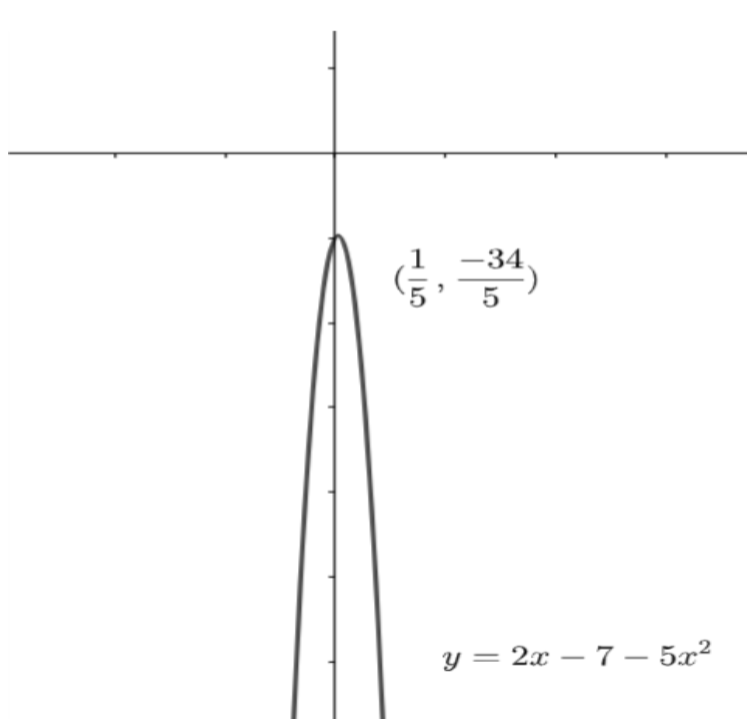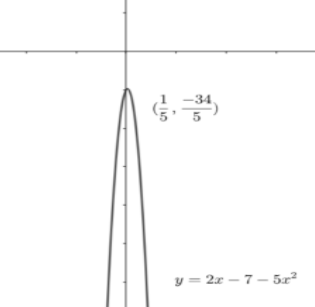
Find the maximum or minimum value of the quadratic expression \[2x-7-5{{x}^{2}}\].
Answer
586.2k+ views
Hint: We know that the minimum or maximum value of a quadratic expression \[y=a{{x}^{2}}+bx+c\] is \[\left( \dfrac{4ac-{{b}^{2}}}{4a} \right)\] at \[x=\dfrac{-b}{2a}\]. If $a <0$, then the quadratic expression will have a maximum value. We will compare \[2x-7-5{{x}^{2}}\] with \[a{{x}^{2}}+bx+c\]. Now, we will get the values of a, b and c. With these values of a, b and c, we will find the minimum or maximum values of \[2x-7-5{{x}^{2}}\].
Complete step-by-step solution -
Before solving the question, we should whether a quadratic expression will have maximum value (or) minimum value.
For a quadratic expression \[y=a{{x}^{2}}+bx+c\], if $a< 0$ then the quadratic expression will have maximum value. The maximum value of \[y=a{{x}^{2}}+bx+c\] obtains at \[x=\dfrac{-b}{2a}\]. The maximum value of quadratic expression is \[\left( \dfrac{4ac-{{b}^{2}}}{4a} \right)\].
In the similar way, if $a >0$ then the quadratic expression will have minimum value. The minimum value of \[y=a{{x}^{2}}+bx+c\] obtains at \[x=\dfrac{-b}{2a}\]. The minimum value of quadratic expression is \[\left( \dfrac{4ac-{{b}^{2}}}{4a} \right)\].
The given expression in this question is \[2x-7-5{{x}^{2}}\].
Let us assume \[y=2x-7-5{{x}^{2}}\]
By rewriting the quadratic expression,
\[y=-5{{x}^{2}}+2x-7\]
Now we should compare \[y=-5{{x}^{2}}+2x-7\] with \[y=a{{x}^{2}}+bx+c\].
\[\begin{align}
& a=-5.....(1) \\
& b=2........(2) \\
& c=-7......(3) \\
\end{align}\]
We know that if $a <0$, then the quadratic expression will have a maximum value.
From equation (1), it is clear that the value of a for \[y=-5{{x}^{2}}+2x-7\] is less than zero.
So, the quadratic expression \[-5{{x}^{2}}+2x-7\] will have a maximum value.

We know that the minimum value for a quadratic expression will obtain at \[x=\dfrac{-b}{2a}\].
From equation (2) and equation (3), the maximum value of quadratic expression will obtain at
\[x=\dfrac{-2}{2(-5)}=\dfrac{-2}{-10}=\dfrac{2}{10}=\dfrac{1}{5}.....(5)\].
We know that the maximum value of quadratic expression is \[\left( \dfrac{4ac-{{b}^{2}}}{4a} \right)\].
So, the maximum value of quadratic expression is
\[\dfrac{4ac-{{b}^{2}}}{4a}=\dfrac{4(-5)(-7)-{{(2)}^{2}}}{4(-5)}=\dfrac{4(35)-4}{-20}=\dfrac{140-4}{-20}=\dfrac{136}{-20}=\dfrac{-68}{10}=\dfrac{-34}{5}\].
Hence, the maximum value of \[2x-7-5{{x}^{2}}\] is \[\dfrac{-34}{5}\].
Note: There is an alternative method to solve this problem.
A function f(x) is said to have a maximum or minimum value at the value of x where $f'(x) =0$.
The value of x where f`(x)=0 is said to have a maximum value if $f”(x) <0$.
The value of x where f`(x)=0 is said to have a minimum value if $f”(x) >0$.
Let us assume \[f(x)=2x-7-5{{x}^{2}}......(1)\] .
\[\Rightarrow f’(x)=\dfrac{d}{dx}(2x-7-5{{x}^{2}})=2-10x\]
We have to find the value of x where f`(x) is equal to 0.
\[\begin{align}
& f’(x)=2-10x=0 \\
& \Rightarrow 10x=2 \\
& \Rightarrow x=\dfrac{1}{5}......(2) \\
\end{align}\]
At \[x=\dfrac{1}{5}\], \[f(x)=2x-7-5{{x}^{2}}\] will have a maximum (or) minimum value.
\[f”(x)=\dfrac{{{d}^{2}}}{d{{x}^{2}}}(2x-7-5{{x}^{2}})=\dfrac{d}{dx}\dfrac{d}{dx}(2x-7-5{{x}^{2}})=\dfrac{d}{dx}(2-10x)=-10\]
As $f''(x) <0$, so f(x) will have maximum value at \[x=\dfrac{1}{5}\].
So, substitute equation (2) in equation (1).
\[f(x)=2\left( \dfrac{1}{5} \right)-7-5{{\left( \dfrac{1}{5} \right)}^{2}}=\dfrac{-34}{5}\].
Hence, the maximum value of \[2x-7-5{{x}^{2}}\] is equal to \[\dfrac{-34}{5}\].

Complete step-by-step solution -
Before solving the question, we should whether a quadratic expression will have maximum value (or) minimum value.
For a quadratic expression \[y=a{{x}^{2}}+bx+c\], if $a< 0$ then the quadratic expression will have maximum value. The maximum value of \[y=a{{x}^{2}}+bx+c\] obtains at \[x=\dfrac{-b}{2a}\]. The maximum value of quadratic expression is \[\left( \dfrac{4ac-{{b}^{2}}}{4a} \right)\].
In the similar way, if $a >0$ then the quadratic expression will have minimum value. The minimum value of \[y=a{{x}^{2}}+bx+c\] obtains at \[x=\dfrac{-b}{2a}\]. The minimum value of quadratic expression is \[\left( \dfrac{4ac-{{b}^{2}}}{4a} \right)\].
The given expression in this question is \[2x-7-5{{x}^{2}}\].
Let us assume \[y=2x-7-5{{x}^{2}}\]
By rewriting the quadratic expression,
\[y=-5{{x}^{2}}+2x-7\]
Now we should compare \[y=-5{{x}^{2}}+2x-7\] with \[y=a{{x}^{2}}+bx+c\].
\[\begin{align}
& a=-5.....(1) \\
& b=2........(2) \\
& c=-7......(3) \\
\end{align}\]
We know that if $a <0$, then the quadratic expression will have a maximum value.
From equation (1), it is clear that the value of a for \[y=-5{{x}^{2}}+2x-7\] is less than zero.
So, the quadratic expression \[-5{{x}^{2}}+2x-7\] will have a maximum value.

We know that the minimum value for a quadratic expression will obtain at \[x=\dfrac{-b}{2a}\].
From equation (2) and equation (3), the maximum value of quadratic expression will obtain at
\[x=\dfrac{-2}{2(-5)}=\dfrac{-2}{-10}=\dfrac{2}{10}=\dfrac{1}{5}.....(5)\].
We know that the maximum value of quadratic expression is \[\left( \dfrac{4ac-{{b}^{2}}}{4a} \right)\].
So, the maximum value of quadratic expression is
\[\dfrac{4ac-{{b}^{2}}}{4a}=\dfrac{4(-5)(-7)-{{(2)}^{2}}}{4(-5)}=\dfrac{4(35)-4}{-20}=\dfrac{140-4}{-20}=\dfrac{136}{-20}=\dfrac{-68}{10}=\dfrac{-34}{5}\].
Hence, the maximum value of \[2x-7-5{{x}^{2}}\] is \[\dfrac{-34}{5}\].
Note: There is an alternative method to solve this problem.
A function f(x) is said to have a maximum or minimum value at the value of x where $f'(x) =0$.
The value of x where f`(x)=0 is said to have a maximum value if $f”(x) <0$.
The value of x where f`(x)=0 is said to have a minimum value if $f”(x) >0$.
Let us assume \[f(x)=2x-7-5{{x}^{2}}......(1)\] .
\[\Rightarrow f’(x)=\dfrac{d}{dx}(2x-7-5{{x}^{2}})=2-10x\]
We have to find the value of x where f`(x) is equal to 0.
\[\begin{align}
& f’(x)=2-10x=0 \\
& \Rightarrow 10x=2 \\
& \Rightarrow x=\dfrac{1}{5}......(2) \\
\end{align}\]
At \[x=\dfrac{1}{5}\], \[f(x)=2x-7-5{{x}^{2}}\] will have a maximum (or) minimum value.
\[f”(x)=\dfrac{{{d}^{2}}}{d{{x}^{2}}}(2x-7-5{{x}^{2}})=\dfrac{d}{dx}\dfrac{d}{dx}(2x-7-5{{x}^{2}})=\dfrac{d}{dx}(2-10x)=-10\]
As $f''(x) <0$, so f(x) will have maximum value at \[x=\dfrac{1}{5}\].
So, substitute equation (2) in equation (1).
\[f(x)=2\left( \dfrac{1}{5} \right)-7-5{{\left( \dfrac{1}{5} \right)}^{2}}=\dfrac{-34}{5}\].
Hence, the maximum value of \[2x-7-5{{x}^{2}}\] is equal to \[\dfrac{-34}{5}\].

Recently Updated Pages
Master Class 11 Computer Science: Engaging Questions & Answers for Success

Master Class 11 Business Studies: Engaging Questions & Answers for Success

Master Class 11 Economics: Engaging Questions & Answers for Success

Master Class 11 English: Engaging Questions & Answers for Success

Master Class 11 Maths: Engaging Questions & Answers for Success

Master Class 11 Biology: Engaging Questions & Answers for Success

Trending doubts
One Metric ton is equal to kg A 10000 B 1000 C 100 class 11 physics CBSE

There are 720 permutations of the digits 1 2 3 4 5 class 11 maths CBSE

Discuss the various forms of bacteria class 11 biology CBSE

Draw a diagram of a plant cell and label at least eight class 11 biology CBSE

State the laws of reflection of light

Explain zero factorial class 11 maths CBSE




